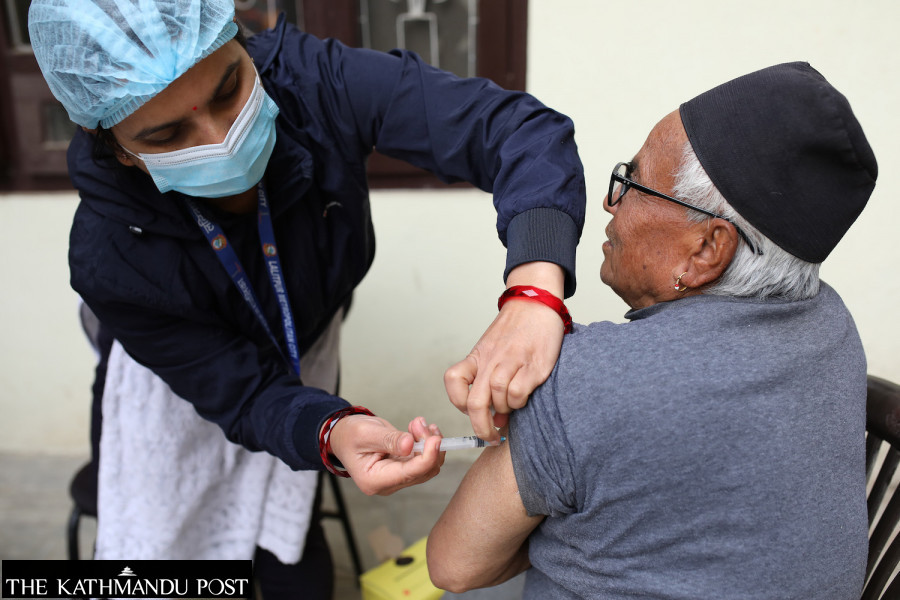Health
Government mulls second booster shots for elderly and comorbid people
Nepalis leaving for Israel have already been vaccinated with second booster shots.
Arjun Poudel
With the new cases of Covid-19 infection spiking over the last few weeks, the Ministry of Health and Population has been planning to administer second booster shots to the elderly people and those having compromised immunity.
Officials said they have held several rounds of discussion to decide on second booster shots.
The ministry has yet to make a decision to start second booster shots, but “pressure has been mounting to start inoculating” the select group of people, an official at the Health Ministry told the Post on condition of anonymity.
“With a growing number of hospitalisations and seriousness from the infection, we are seriously thinking about rolling out second booster shots,” the official said.
Nepal started its booster shot campaign in mid-January after the third wave of the pandemic triggered by the Omicron variant of coronavirus hit the country. The shots were administered on frontline workers, elderly people and those having comorbidities in the initial stage.
Studies show that immunity derived from vaccination and natural infection wanes after six months; for the group of people who were boosted in the first phase, resistance to the virus derived from booster shots might have already been neutralised.
Dr Bibek Kumar Lal, director at the Family Welfare Division, said that while the topic is under discussion, the World Health Organisation’s Strategic Advisory Group of Experts on Immunisation has not said anything regarding second booster shots.
Nepal had started the booster shot campaign before the Strategic Advisory Group of Experts on Immunisation of the UN health agency took a decision regarding that. The Health Ministry has already opened second booster shots to those going to Israel who were administered with first booster shots over six months ago.
Lal said that if the National Immunisation Advisory Committee recommends second booster shots and the government takes a decision about it, the division will implement the decision.
“Coverage of the first dose of booster is very low,” Lal said. “Questions could arise again about vaccine equity.”
As many as 7,386,034 people have been boosted so far. Despite the repeated appeals of the health agencies, uptake of booster shots has not increased significantly.
After the fourth wave of the pandemic driven by Omicron hit the country some three weeks ago, the number of new infections and hospitalisations have been increasing.
Experts say vaccination is the only reliable way to prevent severity and deaths from coronavirus infections.
“Even if vaccination does not prevent infections, it prevents the severity and deaths,” said Dr Prabhat Adhikari, an infectious disease and critical care expert. “Authorities concerned should focus on vaccination, administer booster shots and also provide second booster shots to the front line workers, elderly people and those having comorbidities.”
On Friday, two people died and 781 tested positive for the coronavirus—419 in 2,290 polymerase chain reaction tests and 362 in 2,422 antigen tests.
The Health Ministry said that 47 people, whose health conditions are serious have been admitted in the intensive care units and three others whose health conditions are critical have been placed on ventilator support.
Active cases stand at 5,869 in the country.
Meanwhile, the Logistic Management Section under the Department of Health Services said that it has received 2,884,000 paediatric doses of the Pfizer-BioNTech vaccine from the COVAX facility, the international vaccine sharing scheme, on Sunday.
The doses are part of 8.4 million doses committed by the facility, according to officials.
“We have received all paediatric doses of the Pfizer-BioNTech vaccine,” said Dr Surendra Chaurasia, chief of the section. “The vaccine doses will be provided to children of 27 districts where an immunisation programme will be launched in the second phase.”
The Health Ministry has planned to launch a second phase of immunisation drive to children between five and 11 from August 21 in the remaining 50 districts.
The first phase of the immunisation campaign against Covid-19 for children between five and 11 years was launched in 27 districts on June 23 after Nepal received around 2.2 million paediatric doses of the Pfizer-BioNTech vaccine.
So far, 20,646,379 people have been fully immunised in the country.




 9.6°C Kathmandu
9.6°C Kathmandu















